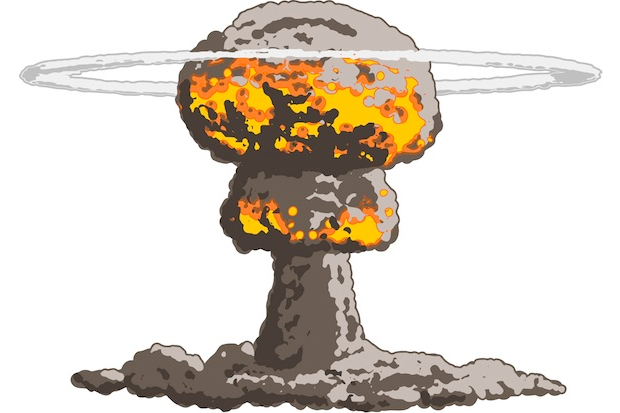Just as every child now thinks he’s going to die of global warming, so those of us who grew up in the Seventies and Eighties all thought we were going to die of nuclear war. We knew this because trusted authorities told us so: not just the government and our teachers but even the author of Fungus the Bogeyman.
When the Wind Blows (1982) was the downer of a graphic novel which Raymond Briggs wrote as our punishment for having enjoyed Fungus. It was about a nice, retired couple called Jim and Hilda Bloggs who somehow survive the first Soviet nuclear strike, unwittingly smell the burned corpses of their neighbours, and end the book praying in their miserable fallout shelter as they vomit, lose their hair and their teeth fall out.
There was another book, too, that we all read around that time. It was by General Sir John ‘Shan’ Hackett and it was called The Third World War. ‘Shan’ obviously knew what he was talking about, a) because he’d fought at Arnhem and b) because he had commanded the British Army of the Rhine. So when he showed Birmingham — which was where I lived then — being nuked by the Soviets, I abandoned all hopes of having children on my knee asking: ‘Deddy, what did you do in the great war against the Red Terror?’
One result of all this brainwashing was that none of my career plans involved surviving much beyond my thirties, which may explain why I’m in such a hopeless mess now. Another is that I’ve ever since been hugely sceptical of anything the authorities tell us about anything, from Aids to the Millennium Bug to the possibility that we’re going to be allowed to escape from the EU, hence my trademark contrarianism. So for better or worse, I suppose I ought to be grateful for the nuclear bomb: it made me who I am.
Today, though, I have more reason than ever to thank the Manhattan Project for its sterling contribution to world peace. (Did you know, by the way, that I was born on the 20th anniversary of Hiroshima?) It has reduced, virtually to nil, the chances of our pitifully useless leaders in the free West doing something so ineffably stupid as to drag us into a war with Russia none of us wants over a place none of us cares about, Ukraine.
Sorry to put it so bluntly, Ukrainians, but there it is. Yes, as a child it’s true that I enjoyed many happy servings of M&S Chicken Kiev; no doubt, at some stage in my life, I may have eaten Ukrainian wheat; I’m also a big fan of Chernobyl, whose post–disaster cancer statistics are very useful to quote at enviro-loons who think nuclear power is deadly dangerous because what those statistics show is the exact opposite. But none of these, I fear, carries quite enough weight to persuade me that Ukrainian sovereignty is something for which I should be prepared, on a point of principle, to lay down my life.
Liam Fox thinks differently, though. ‘We must not accept the incorporation of Crimea into the Russian Federation,’ he said on Sunday, likening it to ‘Hitler’s Sudetenland adventure’. (Gosh. Just remind me how that one ended, Liam.) Hillary Clinton has been making similar comparisons between Putin and Hitler. William Hague has accused ‘bullying’ Russia of starting a new Cold War. John McCain actually wants the US to arm the Ukrainians (what, the pro-Russian ones in the East too, John?). In fact, with odd exceptions like Rand Paul, it’s quite hard to find a leading politician in the West who isn’t hot for old school, retro confrontation with the Russian bear. For those of us who believe that foreign policy should be about looking after one’s national interests rather than, say, honouring some crappy, temporarily expedient agreement signed by a foreign secretary now long since departed, this is all a bit worrying. What would make it a lot more worrying, though, is if any of these posturing Eighties throwbacks had the power to fulfil their Top Gun/Red Dawn fantasies, which thanks to the balance of terror they don’t.
Russia, there is no question, is on a massive remilitarisation programme. It has tripled its defence spending from 0.5 per cent to 1.5 per cent of GDP; having spent a tenth of what the US did on navy shipbuilding in 2008, it was up to half the US budget last year; it’s building 2,300 new Armata tanks (to go with the 18,000 old models); it’s planning 1,200 new helicopters, 50 new ships, 28 new submarines; as part of a £400 billion plan announced by Putin in 2010, it is going to upgrade 10 per cent of its military equipment a year for its new, better paid, professional, non-conscripted million-man armed forces.
Are we then going to take urgent pre-emptive action to deal with this problem? Of course we’re not: not with defence spending decreasing across the EU, with our army reduced from 108,000 in 2010 to 82,000 by 2018. And even if we did, what would we be trying to achieve? To show the Russians how jolly wrong we think it is for them to grab back a bit of the Motherland which was historically theirs anyway? To earn the privilege of bringing the economically useless western part of the Ukraine into the EU?
That’s the glory of nuclear weapons. They render all this silly speculation entirely redundant. We’re not going to have a pointless war with Russia because, unlike in our pointless wars with Afghanistan or Libya or Iraq, we know that if we do someone, somewhere, is going to get nuked. And none of us wants to get nuked, which is the whole point of having nukes. In my childhood, they kept me awake at night. Now they help me sleep. Mutually assured destruction: don’t you just love it?
Got something to add? Join the discussion and comment below.
Get 10 issues for just $10
Subscribe to The Spectator Australia today for the next 10 magazine issues, plus full online access, for just $10.
You might disagree with half of it, but you’ll enjoy reading all of it. Try your first month for free, then just $2 a week for the remainder of your first year.















Comments
Don't miss out
Join the conversation with other Spectator Australia readers. Subscribe to leave a comment.
SUBSCRIBEAlready a subscriber? Log in